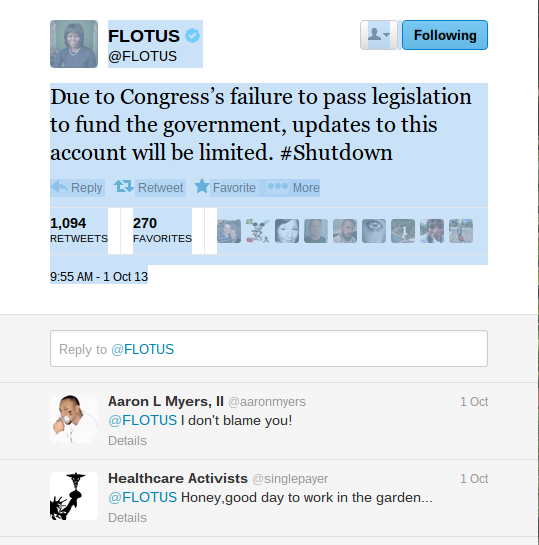by | ARTICLES, OBAMA, POLITICS
 The Democrats (and some others) have been screaming for all the country to hear that the upcoming debt ceiling vote should not have to be. After all, once Congress passes a law that involves paying for something, and the President signs it, the country has an obligation to “pay its bills”, right?
The Democrats (and some others) have been screaming for all the country to hear that the upcoming debt ceiling vote should not have to be. After all, once Congress passes a law that involves paying for something, and the President signs it, the country has an obligation to “pay its bills”, right?
Wrong. This rationale is utter nonsense, as Congress has the sequence of events exactly backward. If Congress passes any law that would have the effect of increasing the country’s debt above the plainly existing (for all to see) debt limit, and has not first dealt with the obligation of how to get the debt ceiling increased so that the bills could be paid, Congress and all the members who have voted for those bills have abrogated their fiduciary responsibility.
For more than 100 years until WWI, Congress was obligated under law to approve each spending measure that resulted in accrued debt. Bonds were either approved or not approved, which kept spending and debt limits in check. That procedure is no longer in affect today. That is unfortunate.
For those who advocate for an unlimited debt ceiling, one should place their same arguments in an individual or business context. For instance, if a family only has $1,000 of available cash reserves, and for some reason commits itself to spend $1,200, where does the blame lie? And from where does the extra $200 come? And should that family have a continuous, open-ended stream of money to spend as it sees fit? Or look at it from a business perspective — every business wants to spend to succeed. However without the prudence and final decisions of the Chief Financial Officer obligated to operate under yearly and long-term budgets, the business runs the risk of swiftly becoming insolvent.
The same common sense should be applied to Congress as it once was. Do we spend before we know how we are going to pay for it, or do we know how we are going to pay for it before we spend? Let’s please get our sequence straight and financial house in order.
by | ARTICLES, BLOG
Hey folks —
Just remember, the very same Administration actively blocking your access to monuments, etc is the same Administration now in charge of your access to health care.
by | ARTICLES
So, the FLOTUS account on Twitter posted this yesterday morning

So, a few questions come to mind:
1) Isn’t Twitter free?
2) If FLOTUS isn’t doing her own TWITTER (for free), can we assume the Twitter position for her is “non-essential” personnel?
3) Do we taxpayers need to be paying someone to Twitter for the FLOTUS, especially since 2 million (37%) of her followers are fake?
by | BLOG, ECONOMY, OBAMA, POLITICS
On the eve of the government shutdown, Obama remarked that “I shouldn’t have to offer anything”, and that he’s always ready to have a conversation:
“Steve when you say what can I offer? I shouldn’t have to offer anything,” Obama said. “They’re not doing me a favor by paying for things that they have already approved for the government to do. That’s part of their basic function of government; that’s not doing me a favor. That’s doing what the American people sent them here to do, carrying out their responsibilities.
“I have said consistently that I’m always happy to talk to Republicans and Democrats about how we shape a budget that is investing in things like early childhood education, rebuilding our roads and bridges and putting people back to work, growing our economy, making sure that we have the research and development to stay at the cutting edge and that deals with some of our long-term debt issues. But we’re not going to accomplish those things if one party to this conversation says that the only way that they come to the table is if they get 100 percent of what they want and if they don’t, they threaten to burn down the house”
So, let’s do a trip down memory lane to see how Obama’s grand budget ideas have turned out in the last few years.
President Obama’s proposed FY2012 budget was voted down by the Democrat-led Senate 97–0. Not one Democrat or Republican Senator would sponsor it, put his name to it, or vote for it. And that budget was no prize—according to the Congressional Budget Office, that proposal never had an annual deficit of less than $748 billion, would double the national debt in 10 years and would see annual interest payments approach $1 trillion per year.
Obama’s proposed FY2103 budget was defeated in the House of Representatives by a vote of 414-0. That was a $3.6 trillion budget proposal that included, among many things, tax hikes and increased energy spending. No Democrats would even vote for that one either.
Obama submitted his FY2014 budget late by two months, in April of this year. By that time, the House had already created and voted on a budget, as did the Senate (first time for the Senate in a few years). OBama’s FY2014 budget was $3.8 trillion this time, and managed to upset both sides of the aisle — the Republicans because it containted more tax hikes, and the Democrats, because it made systemic changes to Social Security. Incidentially, Obama’s budgets were late 4 out of 5 budget cycles, 2010 being the only year he submitted it on time.
So here we have arrived at a government shutdown. Obama’s recent budgets have been continuously and unilaterally rejected by both the Senate and the House, by both Democrats and Republicans, and we are 1616 days without a budget. So please Mr. Obama, don’t offer us anything more. Your ideas have been tried and found wanting. Get out of the way.
 The Democrats (and some others) have been screaming for all the country to hear that the upcoming debt ceiling vote should not have to be. After all, once Congress passes a law that involves paying for something, and the President signs it, the country has an obligation to “pay its bills”, right?
The Democrats (and some others) have been screaming for all the country to hear that the upcoming debt ceiling vote should not have to be. After all, once Congress passes a law that involves paying for something, and the President signs it, the country has an obligation to “pay its bills”, right?